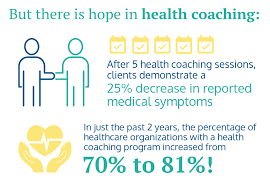
Disrupt Negative Thinking Through The Power Of Gratitude

 919-999-0831
919-999-0831

Clarissa A. Kussin, ND, FMCHC, ERYT-500

New Year’s is the time when everyone is looking toward the year ahead and all that they want to achieve. While people make resolutions with the best of intentions, few follow through and achieve their goals. This is where health coaching comes in handy.
Health coaches help support clients as they work toward making sustainable lifestyle changes. They are passionate about helping others live happier and healthier lives. This includes helping them stick to New Year’s resolutions. Whether you want to reduce stress, eat better, or move more, health coaches can guide the way.
The Power of Personalized Guidance:
A health coach is your dedicated partner on your wellness journey, offering personalized guidance that goes beyond generic advice. They work with you to create a tailored plan based on your unique needs, preferences, and health goals.
Medical Benefits of Having a Health Coach:
How to Get Started:
If you’re ready to experience the transformative benefits of health coaching, reach out to us today! Our team of experienced health coaches is here to guide you on your journey to optimal health. Call 919.999.0831 to get scheduled.
Remember, investing in your health is an investment in a brighter and more fulfilling future.
To your health and happiness!
References:
Wing, R. R., et al. (2018). Intensive lifestyle intervention in type 2 diabetes. New England Journal of Medicine.
Ockene, I. S., et al. (2007). The role of counseling in the promotion of healthy behaviors in adults. JAMA.
Huffman, J. C., et al. (2018). The role of stress and psychosocial interventions in cancer. Current Psychiatry Reports
Warburton, D. E. R., et al. (2006). Health benefits of physical activity: the evidence. Canadian Medical Association Journal
Your Partner In Health,
Clarissa A. Kussin, ND, FMCHC, ERYT-500

Erica Nelson, MSPH, NBC-HWC
They say the mind is a wonderful servant but a terrible master. Are you in charge of your mind and body? Or do you feel like you are at the mercy of your thoughts and feelings (physical and emotional)? This article shares cost-free and drug-free practical strategies to take back control of your physical and emotional feelings and make your mind your servant.
Your nervous system is complicated but you do not need to know all of the details to have a significant impact on its function. In this article you will find a very simple description of how one specific nerve, the Vagus, connects your physical and emotional feelings. You will also learn practical things you can do to reduce anxiety, improve digestion and overall wellbeing.
Starting from the top, the brain branches out from your skull through 12 cranial nerves (and their branches) known as the peripheral nervous system.

Starting from the ‘bottom’ the gastrointestinal ‘mind’ is called the enteric nervous system (ENS.) The ENS has more nerve cells than the rest of the entire nervous system combined (more than 100 million!) and is capable of functioning independently of the rest of the nervous system.
The Vagus nerve is one of the 12 cranial nerves. It connects your brain to your digestive system and vice versa. It sends and receives both motor (movement) and sensory (feeling) signals. Beyond the digestive system, it touches nearly every major organ and plays a role in heart rate, respiration, facial expression, inflammation, sweating, reproduction and more.
Photo courtesy:
www.drarielleschwartz.com

The word ‘Vagus’ comes from the Latin for ‘wander’ but, as Tolkien wisely said, ‘Not all who wander are lost.’ This nerve, and its branches serve as the information super highway in your body and provide the early warning system for threats, internal and external.
Most of these functions are reflexes that happen without you thinking about them to keep you alive. Can you imagine if you had to decide to shunt blood supply from your stomach to your heart and lungs to run from danger? But sometimes the reflexes are not actually helpful in the moment and we are left feeling like our stomachs have minds of their own – because they kind of do. But when we know what the reflexes respond to, we can take steps to trigger a more desirable response.
Toning the Vagus for Stress Resilience
Have you ever felt your mouth go bone dry just as you are about to begin a presentation or performance? Or worse, maybe you feel like you are going to throw up? Or need to go to the bathroom RIGHT NOW. This is your reflexive response to stop bodily secretions and smooth muscle contractions in your GI tract so you can spend your resources elsewhere.
When you perceive a threat, your brain and body make preparations to respond and additional resources – oxygen, fluids, etc. – are diverted from digestion and reproduction until you are physically and psychologically safe again. Your heart rate, blood pressure and breathing increase, your pupils dilate, your mouth may go dry, your muscles may begin to tremble all of these are signs of activation of your sympathetic nervous system.
It is the job of the parasympathetic nervous system, including the Vagus nerve, to restore resources to ‘rest and digest’ once the threat (perceived or real) is passed. Depending on the duration and intensity of the threat, it may take 20 minutes or 20 years to return to a healthy resting state. When left unattended, chronic stress or PTSD can have long-term effects on your physical, cognitive and emotional health.
This exercise lengthens and contracts the Vagus nerve to activate it. Get on your hands and knees on the floor. Begin with a neutral spine and then press down through your hands and knees to arch your back upwards like a cat. Inhale while doing this. Then drop your belly down towards the floor and lift your breastbone forward and up. Exhale loudly while you do this, sticking your tongue out and even roaring like a lion.
Laughter really is one of the best medicines. Real laughter is best but even fake laughter will engage the Vagus nerve through contraction of the diaphragm.
A warm embrace, ideally 20 seconds or longer, will stimulate the part of the Vagus nerve that runs down your back and can trigger the release of a hormone called oxytocin, known as the feel-good hormone.
The Vagus nerve is connected to your vocal cords and the muscles at the back of your throat. All of these activities activate the muscles around the nerve and can stimulate it. Choose one or more and find time for it each day.
Place the tip of your tongue against the ridge of tissue just behind your upper front teeth, and keep it there through the entire exercise. Exhale completely through your mouth, making a whoosh sound. Close your mouth and inhale quietly through your nose to a mental count of four. Hold your breath for a count of seven. Exhale completely through your mouth, making a whoosh sound to a count of eight. This is one breath. Now inhale again and repeat the cycle three more times for a total of four breaths.
This works for a couple of reasons. First, when you are walking, your eyes naturally move side-to-side and trigger a response in your brain that distracts it from threat. Second, you are using up some of the ‘energy hormones’ that were dumped into your system to respond to the threat and may be making you feel ‘jittery.’
Stroke your neck from your ear to your clavicle 10 times on each side. Again, your Vagus nerve is connected to these muscles. Moderately intense massage to the area will stimulate the nerve and help to restore a resting state.
You do not have to be at the beck and call of your body’s reflexes. Choose one or two of the strategies above and integrate them into your day to improve your ability to respond the way you want to – instead of simply reacting – the next time you are faced with a stressful situation.
Call our office and schedule an appointment with one of our health coaches to learn more healthy strategies to reduce and respond to physical, emotional and cognitive stress.
Your Partner in Health!
Erica Nelson, MSPH, NBC-HWC

Erica Nelson, MSPH, NBC-HWC

The legendary basketball coach, John Wooden once said, “A good coach can change a game. A great coach can change a life.” At Carolina Total Wellness, our coaches help our patients change their lives every day.Every patient at Carolina Total Wellness that sees a doctor or physician assistant is paired with a health coach. Some patients may also choose to work solely with a health coach to achieve their dietary and lifestyle goals. This article will help you know what to expect when you work with a health coach.
Here are 3 key aspects of the health coaching experience at Carolina Total Wellness:
The Space Between
Health coaches hold space for you to pause… and decide how you want to respond to your circumstances. The world today is a seemingly relentless onslaught of stimulation, and it can feel like there is an urgency to react to all of that stimulation.
George Mumford, meditation coach to Michael Jordan, LeBron James, Kobe Bryant and other world-class athletes offers another way, ‘Think about the eye of a hurricane.’ He says, ‘No matter how intense the storm or what’s swept up in its gale-force winds, that calm, blue center is always there. We all have this quiet center within us.’ Your CTW coach will help you respond from that quiet center within, rather than reacting from the chaos of the storm.
In our office, health coaches hold space for you to make sense of what is going on in your world and in your body and decide how you want to respond. Health coaches always honor the fact that you are the expert on your own life and display unconditional positive regard for you and whatever lifestyle decisions you choose. They pay attention to what matters to you and may offer suggestions for adjustments that fit into your life.
Translator
The science of the body and its systems are the physician’s expertise. Science of behavior change is the coach’s expertise. Our coaches help you translate medical science you discuss with your doctor or PA into evidence-based behavioral change strategies to optimize your health. When you combine the medical knowledge of our physicians and PA with your coach’s expertise in the science of motivation, habits, and change, many of the barriers to experiencing health fall away.
Each of the coaches at CTW has at least a bachelor’s degree from an accredited university and training in coaching from either the Functional Medicine Coaching Academy or Duke University. Some of them also have master’s degrees and other specialized training in nutrition, exercise, counseling, and other relevant fields. Unless otherwise specified, CTW coaches are not registered dietitians, licensed mental health professionals or certified fitness professionals.
Guide
In the words of Michael Jordan, ‘A coach is someone that sees beyond your limits and guides you to greatness!’ CTW coaches come to the table with empathy for whatever you are facing and feeling and confidence in your ability to overcome. Each coach has faced their own struggles in life and knows what it is like to work hard to overcome. However, coaches never replace you as the expert on you; they serve as your guide on your journey to health. Coaches can help you understand all the different ways you can try intermittent fasting or yoga or what, exactly, is ‘glycemic index.’ Maybe our most important job, though, is to help you get very clear on your vision of the healthiest version of you. Once you decide where it is you want to go, coaches provide education, support and accountability to knock down any stumbling blocks that may come up along the way.
Call us today to schedule your appointment with one of our health coaches.

Erica Nelson, MSPH, NBC-HWC

The last couple of years have been hard on everyone. The pandemic has caused so many disruptions in our lives – lost jobs and income, friends and loved ones becoming ill, children home from school and missing socialization, feeling more isolated and less connected. It’s no wonder that an even greater number of people have reported feeling anxious.
Talk therapy, supplements, exercise and medication are beneficial solutions for curbing anxiety. There are also practical strategies you can utilize when experiencing anxiety.
1) Box Breathing – If you’ve ever practiced meditation then you know how helpful mindful breathing can be to calm your nervous system. Close your eyes and then breathe slowly in for four counts. Hold your breath for four counts and then exhale slowly for four counts. At the bottom of the exhale count to four while doing nothing. Repeat this process for a total of four times. Once completed you should feel much more relaxed and centered.
2) Name Objects in Your Line of Vision – If your thoughts are spiraling out of control you can change your state of mind by simply naming objects that you see. Keep doing this as long as you need to until you feel your energy begin to mellow. This works because you are changing which hemisphere of your brain is being used, moving from the emotional side to the logical side.
3) Mantras – Taking the time to recite a mantra is valuable for grounding feelings of anxiety. Some examples are “I am safe”, “I am peaceful”, “I am loved” or “With every breath I feel myself relaxing”. Write down your own affirmations that resonate with you the most and then say them repeatedly when you’re feeling anxious.
4) Gratitude – We cannot be in a state of fear or anxiety and be in a state of calm or peace a the same time. Pausing to “count your blessings” will transition your energy into a more relaxed vibration. Write down five things you are grateful for or if you can’t write them down, list them in your mind.
The next time you find your heart beating fast or your mind racing, try practicing these strategies to ground your energy.
The next time you find your heart beating fast or your mind racing, try practicing these strategies to ground your energy.
If you or someone you know can benefit from working with our health coaches please contact our office to make an appointment.
In health,
Sara Yadlowsky, FMHC


 |
| Meditate on your feelings to get calm, grounded, and healthy.Our emotions can hold us hostage when their stormy winds of intensity and disharmony blow through the body. For example, when you’re angry, your belly can tighten, your heart might pound, and agitating thoughts can plague you for minutes, hours, or even days. This is because emotions, be they angry, peaceful, anxious, sad, or happy, activate your nervous system to release chemicals into your bloodstream that can pull your focus and energy away from other matters. When emotions are that strong, we may be tempted to label them the “enemy.” But refusing to accept how you feel only postpones the inevitable; every emotion you deny will always return, trying to convey important information. In a world full of stress and demands, rest is one of the most important factors for creating wellness. Restorative activities can include mental, physical, and/or emotional activities that help to promote resilience. Particularly if you are under chronic stress, restful activities can break the cycle of stress and assist you on the path to health. Get Unstuck Knowing that the brain is not static, but instead has plasticity, underlines one of the key reasons to practice restful habits: you can learn to be healthier, happier, and more connected. Focusing on the process of restoration, rather than current complaints or states, allows you to take charge of your own health and wellness. You can become more resilient and healthier. The Right Activities Many people turn to television, alcohol, or other semi-harmful activities to counteract stress. Replacing even a few minutes a day of those activities with ones that scientifically promote healing and restoration can trigger lasting improvements. Restoration activities like meditation, guided imagery, breathing techniques, gratitude, and mindfulness are time-honored, science-backed ways to make a difference internally. They have calming effects not only on the state of mind, but also helping to balance hormonal and immune function. Don’t let stress run the show. Select a restoration activity and see if it works for you—whether that’s finding something to feel grateful about every day or trying a new yoga pose. Be intentional and open. Take back a few minutes a day of your life, balance your emotions, and your health and wellness will follow. Restorative Activities Meditation Gratitude Journaling Deep breathing and breathing techniques Guided Imagery and/or Visualization Massage, Sauna, or Water Therapy Mindful Eating, Walking, or Body Scan Many others! A wide variety of conditions are assisted by restoration therapies, including: Anxiety, depression, and mood disorders Cancer Chronic pain and fibromyalgia Gastrointestinal disorders Sleep disturbances and stress disorders Heart disease, diabetes, and hypertension Hot flashes Asthma Emotions are messengers, here to deliver information about empowering actions you need to take in your life and relationships. Just as it takes time to strengthen muscles, it also takes time to strengthen your ability to welcome and respond to your emotions, rather than avoid them. Lean on them to find creative solutions and successfully navigate life. Your Partner In Health! Clarissa A. Kussin, ND, RYT-500 |
Functional medicine is a science-based health care approach to assess, prevent and treat complex chronic disease.
![]() Learn More
Learn More
After a brief allergy test, you can begin sublingual immunotherapy (SLIT), or allergy drops under the tongue. No more allergy shots!
![]() Learn More
Learn More
Learn how to prepare for your visit and what to expect at your initial consultation and at your follow-up visits with our office.
![]() Learn More
Learn More